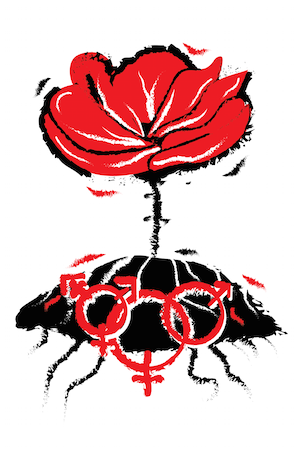Combating Toxic Masculinity
Masculinity is defined as a set of attributes, behaviors, and roles associated with men and boys. Far too often these attributes include traits such as aggression, domination, sexual prowess, and a penchant for violence. In our patriarchal world, we are inundated with this version of masculinity even before birth. Many of these ideals are intertwined in our upbringing. Competition and domination are idolized in such areas as academics, economics, and (sometimes violent) sports, and boys are constantly pressured to conform to general gender roles no matter how they feel about them. Feminism and socialist feminism rightly identify this “toxic” masculinity as unacceptable and have pushed this criticism to the forefront of our cultural debate on social equality.
 Unfortunately, some reactionary forces have misrepresented the critique as a war on men and masculinity as a whole. Provocateurs such as Canadian psychologist Jordan Peterson gain followers (and fame and money) by rationalizing and defending toxic gender norms with pseudoscientific hypotheses. Their message appeals to many men because it justifies the picture of masculinity that society has painted for them their whole lives, a picture that places them at the top of the cultural hierarchy.
Unfortunately, some reactionary forces have misrepresented the critique as a war on men and masculinity as a whole. Provocateurs such as Canadian psychologist Jordan Peterson gain followers (and fame and money) by rationalizing and defending toxic gender norms with pseudoscientific hypotheses. Their message appeals to many men because it justifies the picture of masculinity that society has painted for them their whole lives, a picture that places them at the top of the cultural hierarchy.
The decline of working- and middle-class men’s fortunes under neoliberalism has given many men a very real reason to be upset. However, instead of directing the anger toward corporate power, where it belongs, the reactionary message misdirects it toward women, immigrants, religious minorities, and the marginalized. Sexual assault, domestic violence, and mass shootings have deep roots in our culture’s model of masculinity and cannot be fully addressed without a socialist feminist perspective.
Our task in the face of these circumstances, as bell hooks points out in The Will to Change: Men, Masculinity, and Love, is to articulate clearly an alternative definition of masculinity based on positive and inclusive attributes. Because masculinity is a collection of traits based on cultural assumptions about men and boys, we can then work toward a socialist feminist masculinity by reimagining these assumptions with equality and partnership in mind.
A starting point might be the “chief constituents” of feminist masculinity described by Olga Silverstein in The Courage to Raise Good Men. Traits such as integrity, assertiveness, emotional awareness, relational skill, self-love, and responsibility to self and community should be gender neutral and held up as core ideals. As socialists, we should envision solidarity and egalitarianism as a part of healthy masculinity. On a practical level, we can start by joining anti-patriarchy groups or organizing child watch efforts in our DSA chapters. We can model anti-sexist behavior in our DSA chapters and speak out against harassment of women and sexist comments whenever and wherever we see them.
These traits and actions represent some of the building blocks from which we can start to construct a new framework for a masculinity based on socialist feminist ideals. Articulation of a new, inclusive definition of masculinity will guide us toward a world liberated from patriarchal oppression and offer men a constructive alternative to the status quo. As socialist feminists, we should push for and openly discuss this new definition of masculinity. And as socialist feminist men we should represent these ideals in our everyday lives, for the benefit of society, as well as ourselves.
 Democratic Socialists of America
Democratic Socialists of America